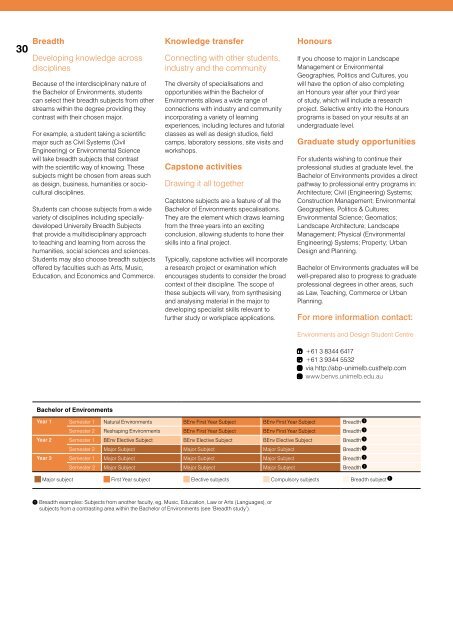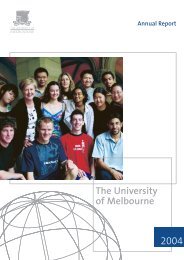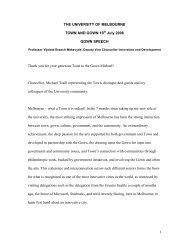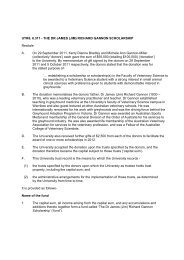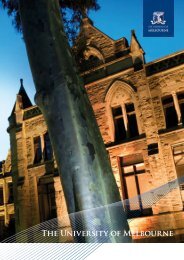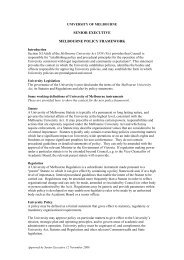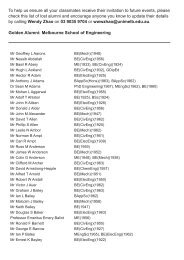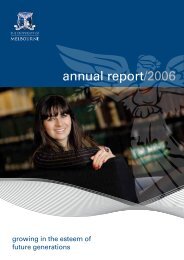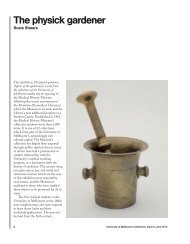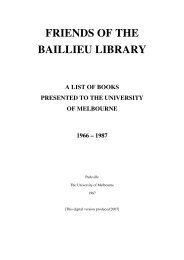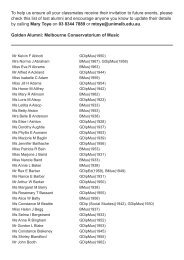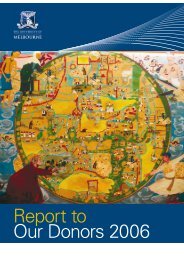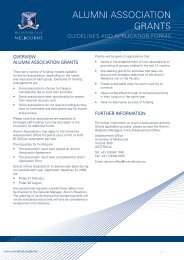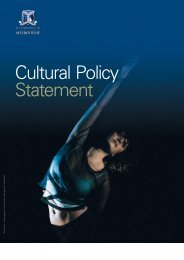2010 International Undergraduate Prospectus nts. u.au
2010 International Undergraduate Prospectus nts. u.au
2010 International Undergraduate Prospectus nts. u.au
Create successful ePaper yourself
Turn your PDF publications into a flip-book with our unique Google optimized e-Paper software.
30<br />
Breadth<br />
Developing knowledge across<br />
disciplines<br />
Bec<strong>au</strong>se of the interdisciplinary nature of<br />
the Bachelor of Environme<strong>nts</strong>, stude<strong>nts</strong><br />
can select their breadth subjects from other<br />
streams within the degree providing they<br />
contrast with their chosen major.<br />
For example, a student taking a scientific<br />
major such as Civil Systems (Civil<br />
Engineering) or Environmental Science<br />
will take breadth subjects that contrast<br />
with the scientific way of knowing. These<br />
subjects might be chosen from areas such<br />
as design, business, humanities or sociocultural<br />
disciplines.<br />
Stude<strong>nts</strong> can choose subjects from a wide<br />
variety of disciplines including speciallydeveloped<br />
University Breadth Subjects<br />
that provide a multidisciplinary approach<br />
to teaching and learning from across the<br />
humanities, social sciences and sciences.<br />
Stude<strong>nts</strong> may also choose breadth subjects<br />
offered by faculties such as Arts, Music,<br />
Education, and Economics and Commerce.<br />
Knowledge transfer<br />
Connecting with other stude<strong>nts</strong>,<br />
industry and the community<br />
The diversity of specialisations and<br />
opportunities within the Bachelor of<br />
Environme<strong>nts</strong> allows a wide range of<br />
connections with industry and community<br />
incorporating a variety of learning<br />
experiences, including lectures and tutorial<br />
classes as well as design studios, field<br />
camps, laboratory sessions, site visits and<br />
workshops.<br />
Capstone activities<br />
Drawing it all together<br />
Captstone subjects are a feature of all the<br />
Bachelor of Environme<strong>nts</strong> specalisations.<br />
They are the element which draws learning<br />
from the three years into an exciting<br />
conclusion, allowing stude<strong>nts</strong> to hone their<br />
skills into a final project.<br />
Typically, capstone activities will incorporate<br />
a research project or examination which<br />
encourages stude<strong>nts</strong> to consider the broad<br />
context of their discipline. The scope of<br />
these subjects will vary, from synthesising<br />
and analysing material in the major to<br />
developing specialist skills relevant to<br />
further study or workplace applications.<br />
Honours<br />
If you choose to major in Landscape<br />
Management or Environmental<br />
Geographies, Politics and Cultures, you<br />
will have the option of also completing<br />
an Honours year after your third year<br />
of study, which will include a research<br />
project. Selective entry into the Honours<br />
programs is based on your results at an<br />
undergraduate level.<br />
Graduate study opportunities<br />
For stude<strong>nts</strong> wishing to continue their<br />
professional studies at graduate level, the<br />
Bachelor of Environme<strong>nts</strong> provides a direct<br />
pathway to professional entry programs in:<br />
Architecture; Civil (Engineering) Systems;<br />
Construction Management; Environmental<br />
Geographies, Politics & Cultures;<br />
Environmental Science; Geomatics;<br />
Landscape Architecture; Landscape<br />
Management; Physical (Environmental<br />
Engineering) Systems; Property; Urban<br />
Design and Planning.<br />
Bachelor of Environme<strong>nts</strong> graduates will be<br />
well-prepared also to progress to graduate<br />
professional degrees in other areas, such<br />
as Law, Teaching, Commerce or Urban<br />
Planning.<br />
For more information contact:<br />
Environme<strong>nts</strong> and Design Student Centre<br />
t +61 3 8344 6417<br />
f +61 3 9344 5532<br />
e via http://abp-unimelb.custhelp.com<br />
w www.benvs.unimelb.edu.<strong>au</strong><br />
Bachelor of Environme<strong>nts</strong><br />
Year 1 Semester 1 Natural Environme<strong>nts</strong> BEnv First Year Subject BEnv First Year Subject Breadth Q<br />
Semester 2 Reshaping Environme<strong>nts</strong> BEnv First Year Subject BEnv First Year Subject Breadth Q<br />
Year 2 Semester 1 BEnv Elective Subject BEnv Elective Subject BEnv Elective Subject Breadth Q<br />
Semester 2 Major Subject Major Subject Major Subject Breadth Q<br />
Year 3 Semester 1 Major Subject Major Subject Major Subject Breadth Q<br />
Semester 2 Major Subject Major Subject Major Subject Breadth Q<br />
Major subject First Year subject Elective subjects Compulsory subjects Breadth subject Q<br />
Q Breadth examples: Subjects from another faculty, eg. Music, Education, Law or Arts (Languages), or<br />
subjects from a contrasting area within the Bachelor of Environme<strong>nts</strong> (see ‘Breadth study’).


